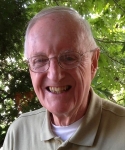
by Joseph Nangle, OFM
Pax Christi USA Ambassador of Peace
[NOTE: The title of Pope Francis’ World Day of Peace message for 2023 is “No One Can Be Saved Alone: Combatting Covid-19 Together, Embarking on Paths of Peace”]

For fifty-six years on January 1st, the World Day of Peace, the Holy Father has written a reflection highlighting that designation. Typically these messages are a call for “all women and men of good will” to strive for an end to wars and to all violence. This custom follows on the unforgettable words of Pope St. Paul VI spoken to the United Nations on October 4, 1965: “No more war, war never again!”
It is particularly appropriate that Pope Francis address the world of this time. He has become in effect the universal pastor responding, seemingly on a daily basis, to current historical moments – and always with insights and encouragement that flow from his towering intelligence and deep life of prayer.

As is his style, this year Pope Francis offers a global social analysis as the framework for his message of peace. He cites the two overriding realities which face humanity as we mark another calendar year on our global journey through time and space; or in spiritual terms, as we experience the current flow of events in salvation history.
Throughout his 2023 message Francis points to the current overriding and conjoined realities: Covid-19 and the war in Ukraine. The first, he says, “plunged us into a ‘dark night’ which disrupted the tranquility even of affluent societies” [to say the least]. And now he says a new disaster has befallen humanity, another scourge, this time “driven by culpable human decisions”.
The Pope observes that this is not what we had expected as we painfully emerged from the pandemic: war, a dreadful “setback for humanity”. Francis continues, “We developed a vaccine for Covid but no suitable solutions have been found for the virus of war.”
[Might we editorialize here and suggest that the growing conviction that only Gospel nonviolence, articulated by the Catholic Nonviolence Initiative, holds the key to developing an “anti-war vaccine”?]
Pope Francis continues his analysis. We emerge from all crises, particularly these which face us today, “either worse or better”. Now three years into it and, please God, overcoming the horrors of Covid, he asks: what have we learned?
He answers that surely one lesson is our need for one another, that we have a “fragile treasure in our shared humanity”. Perhaps, too, in the face of a seemingly local conflict which has reverberated across the globe (“we need but think of worldwide grain shortages and fuel prices”), we are developing a universal sense of humility: rethinking of consumeristic excesses, a renewed sense of solidarity making us more sensitive to the needs of others and more responsive to them. The experience has made us deeply aware of the need for everyone, peoples and nations, “to restore the word ‘together’ to a central place.”
Toward the end of this year’s message, the Holy Father poses the question: “What then is asked of us?” His answer, as one would expect, calls us to be our better selves:
“Let our hearts be changed by this experience of crisis; let God transform our customary criteria for looking at the world, no longer thinking exclusively of personal or national interests – but thinking in terms of the common good; not focusing simply of ourselves. For we belong to a greater community. The time has come for all of us to endeavor to heal our society and our planet.”
Finally, as if he were speaking directly to Pax Christi, our pastor says very simply: “I express my prayerful trust that as ARTISANS OF PEACE, you may work, day by day, to make this a good year!”
Postscript: Truth be told, in reading Pope Francis’ message for 2023, one faces the temptation to think of his hopes and visions as unrealistic, impractical, impossible to attain. Yet isn’t that exactly what the Christmas season is all about? A newborn infant, in an out-of-the-way province of the Roman empire becomes the light shining in the darkness of every age for those who would place their trust in his improbable proposition that in “giving one’s life away one finds it.”
Joe Nangle OFM is a Pax Christi USA Ambassador of Peace. As a member of the Assisi Community in Washington, D.C., he is dedicated to simple living and social change. Joe also serves as the Pastoral Associate for the Latino community at Our Lady Queen of Peace, Arlington, Virginia.

Thank you, Fr. Nangle, for your reflection. And, may each of us internalize Pope Francis’ message and find a strong, positive way forward in our daily activities, regardless of our station in life. Peace!